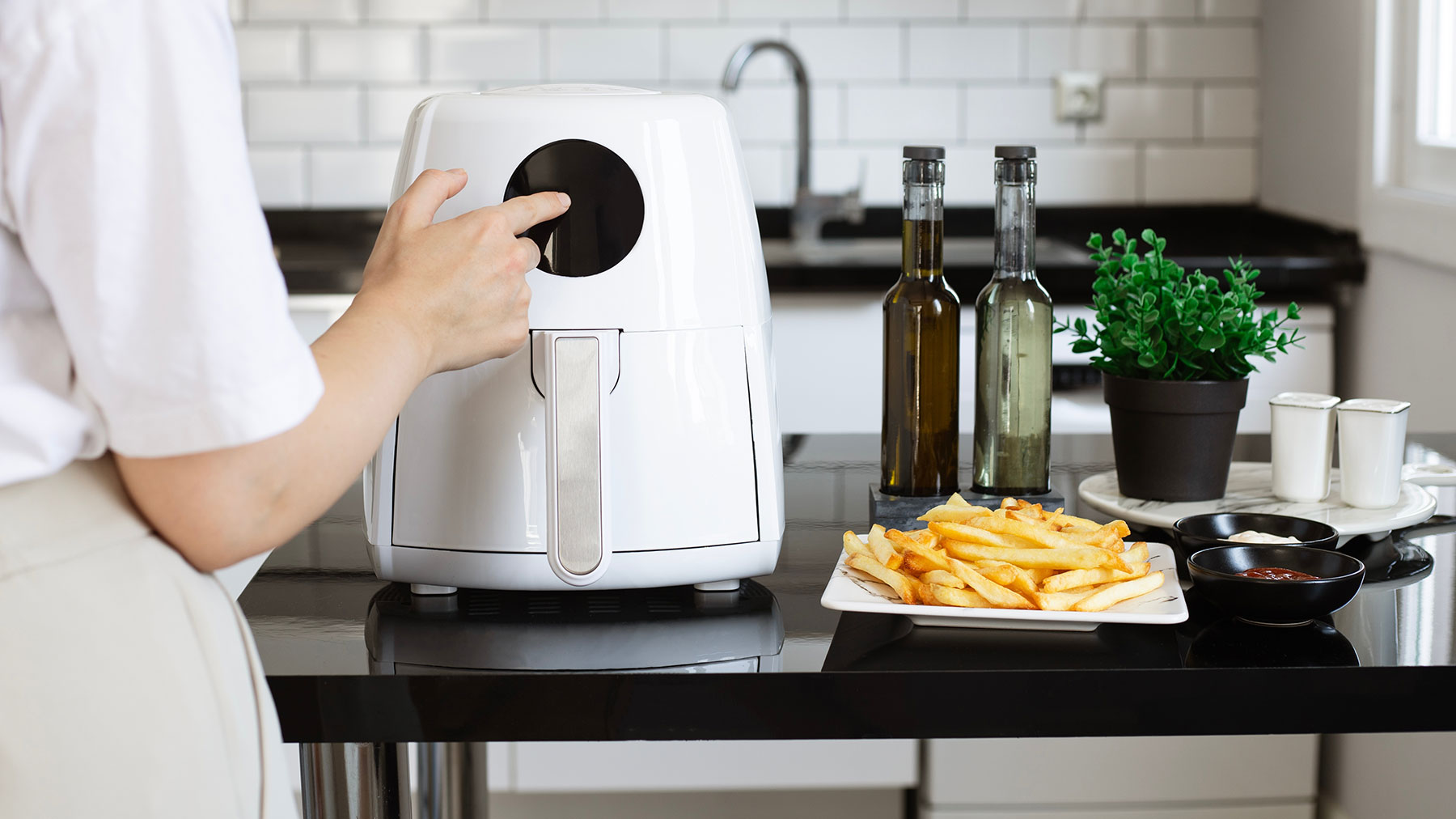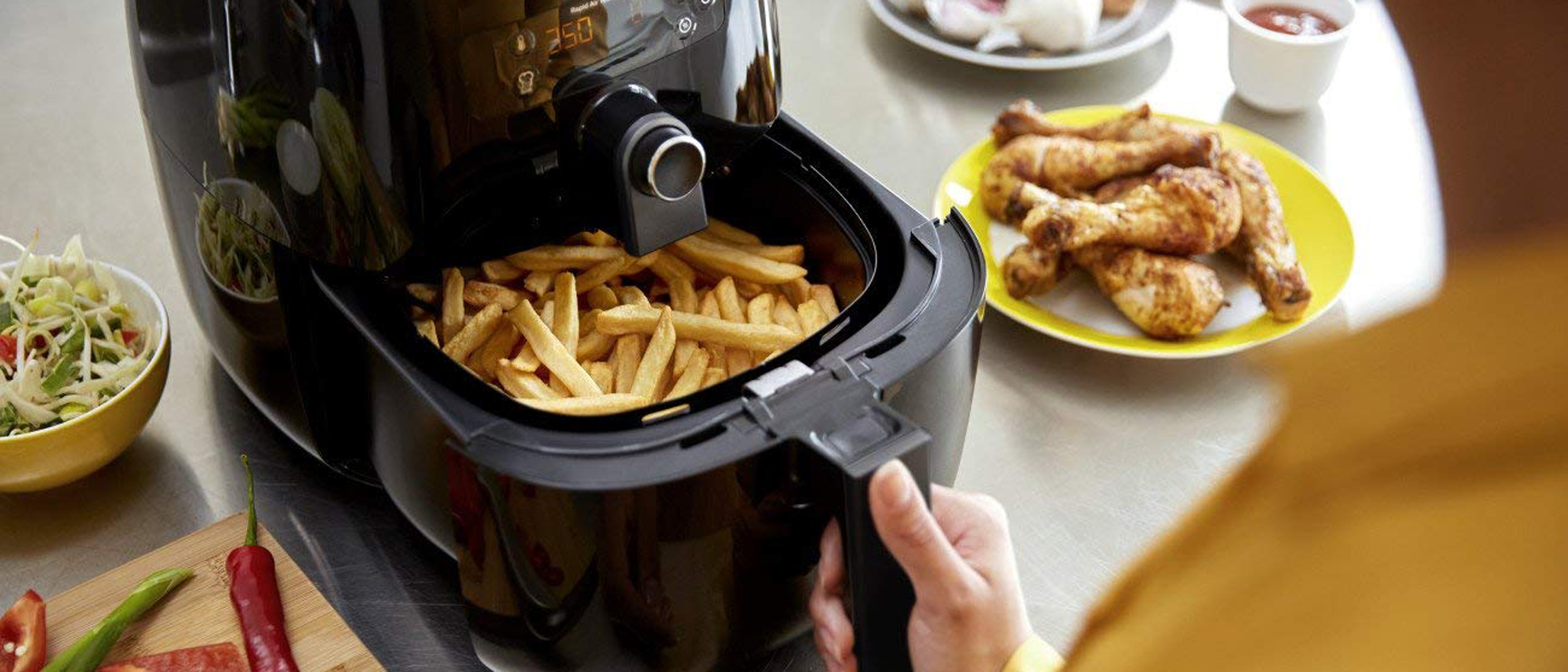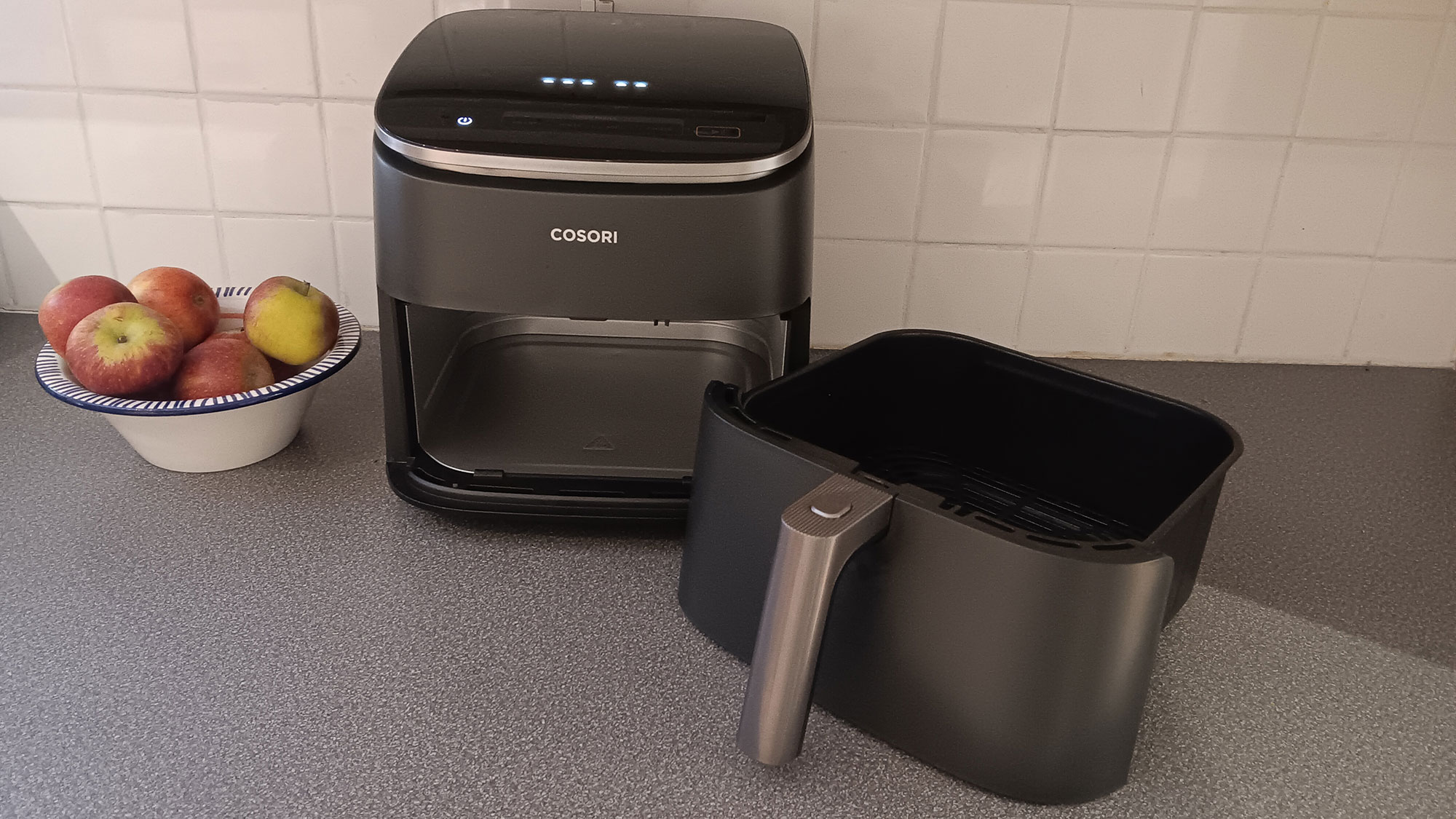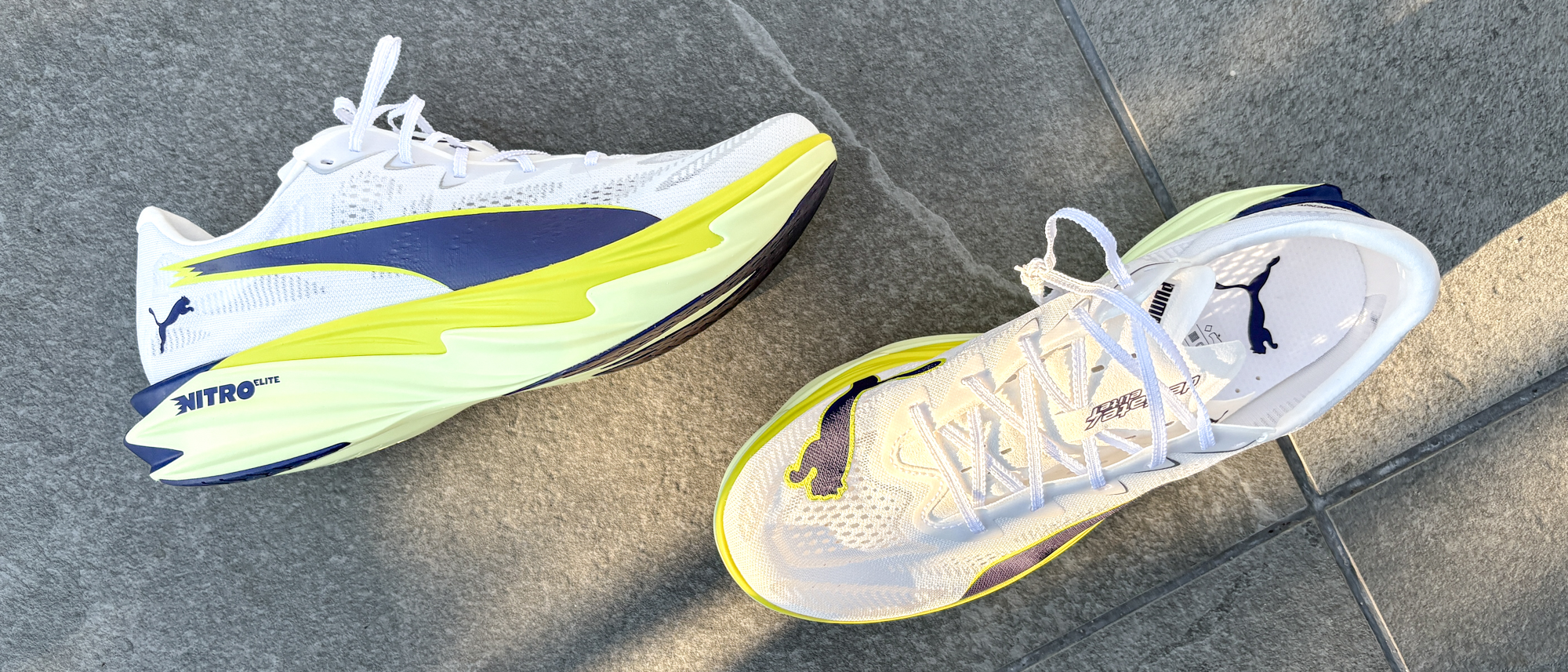Is your air fryer really toxic? We find out from an expert
Social media might not be giving you the whole story

Depending on which rabbit hole you find yourself going down, social media can be an incredible source of recipe inspiration for air fryer cooking. Or, you’ll be freaked out by the increasing amount of content claiming your air fryer is toxic!
But if you're anything like us, once you’ve invested in one of the best air fryers, the idea of ditching it to go back to your oven is unthinkable. So, is this something we all need to consider, or is it another case of social media misinformation?
I spoke to James LeBaigue, MSc, Head of Nutrition at Hurry The Food Up and Founder of Nutrition Triathlon. James is a Registered Sport Nutritionist (SENr), with an MSc in Sports and Exercise Nutrition. He gave me his expert take on whether your air fryer is toxic and damaging to your health.
Are air fryers toxic?

There are several reasons why some people are under the impression air fryers could be toxic, so I cut to the chase and asked LeBaigue what the biggest issues are that people are worried about. He says, “concerns about the safety of air fryers, particularly regarding nonstick coatings and plastic components, have emerged as they have gained more popularity.”
And what about the issue of potentially harmful nonstick coatings? “Historically, worries about toxicity seem to stem from Teflon, which was known to release harmful chemicals when overheated. However, manufacturing techniques and legislation have improved significantly since then.”
LeBaigue went on to explain that “modern air fryers, especially those from reputable brands, use safer materials like ceramic nonstick coatings, which should not be a concern if you purchase a good-quality model.”
In addition to worries about nonstick coatings, plastic within the appliance seems to be another component causing people to worry. However, LeBaigue isn’t too concerned, stating, “plastic in air fryers is typically limited to the exterior, with food-contact parts made from safer materials like metal or ceramic-coated baskets.” He assured me that “if you choose a well-made air fryer, the risk of exposure is minimal.”
Get instant access to breaking news, the hottest reviews, great deals and helpful tips.
People have concerns around Teflon becuse it has historically used PFOA, which is a type of PFAS, in the creation of nonstick surfaces. The World Health Organization’s International Agency for Research on Cancer classifies PFOA specifically as “possibly carcinogenic to humans”, but you'll be relieved to hear that PFOA hasn't been used in the production of Teflon since 2013, according to CancerCenter.com
Many of the most popular cookware and air fryer brands don't use PFAS in their manufacturing process. However, even if they do, Cancer.org expands that "While some PFAS can be used in making some non-stick cookware coatings, they are joined together in large molecules (polymerized) and are tightly bound to the cookware, so very little is capable of getting into food, according to the FDA."
Modern air fryers, especially those from reputable brands, use safer materials like ceramic nonstick coatings, which should not be a concern if you purchase a good-quality model.
James LeBaigue
Is air frying bad for your food?
Anxiety around air fryer toxicity doesn’t purely center around the air fryer components. James explained, “concerns about acrylamide, a chemical formed in some foods during high-temperature cooking, are also prevalent.”
However, he was keen to emphasize that while acrylamide “can form in air-fried foods, it’s not unique to this method.” It’s a chemical that can be formed through a variety of high-temperature cooking methods. James suggests that “the best approach is to avoid burning your food, but the risk is low and shouldn’t deter you from using an air fryer.”
Lastly, LeBaigue points out that “some research suggests that air frying may alter the nutritional profile of certain foods, such as fatty fish.” But he clarifies this by pointing out that “while this is an area of ongoing research, current evidence is primarily mechanistic, meaning it’s based on how air frying might theoretically affect food rather than clear outcomes in human health.”
He is quick to state that “while it’s something to be aware of, it’s not a reason to avoid air frying, especially when weighed against the potential health benefits of reducing the amount of oil used in cooking (not to mention the time saved!).”
DASH Tasti-Crisp™ Ceramic Air Fryer Oven: was $59 @ Amazon
The DASH Tasti-Crisp uses a ceramic nonstick coating, making it completely non-toxic. It's also one of the most affordable air fryers we've tested, and we love the range of colors.
Is my air fryer safe?

Overall, LeBaigue had a positive opinion about the safety of most air fryers. “Air fryers are safe when used correctly. As long as you follow the manufacturer’s instructions, keep the appliance clean, and avoid going for the cheapest models, as better quality often equates to better safety.
To ensure the longevity of your air fryer and to maintain its safety, be mindful of the utensils you use. Avoid metal utensils that can scratch the nonstick coating, as this could lead to flaking and potential food contamination. Opt for wooden or silicone utensils, which are gentler on the appliance and will help preserve its coating.”
In addition, knowing how to care and maintain your air fryer is vital. "I would also advise that you regularly check the non-stick coating on the inside of your air fryer, and if you see any signs that it is flaking or damaged, it’s time to ditch it and upgrade to a new model. If the non-stick coatings are flaking, they could end up in your food, and ingesting them is what may be toxic to health.
Washing your air fryer basket by hand, instead of in the dishwasher is a good way to maintain the non-stick coatings and prolong the life of the appliance. Plus, when you’re cleaning it by hand, you can inspect and check the coatings every time you wash it."
Finally, LeBaigue felt it was important to point out that “air frying is just a cooking method — it doesn’t automatically make food healthy or unhealthy. Consider the nutritional content of what you’re cooking because that will be the most significant factor.”
But if you are still concerned about the safety of air fry cooking, you might prefer to swap to an air fryer with a glass bowl, like Ninja's Crispi, which has the added advantage of being portable too.
What are the best non-toxic air fryers?
If you’re still worried about toxicity from air fryer non-stick coatings or plastic components, firstly I’d advise when buying a new air fryer, to check the coatings used in the non-stick. Look for brands that use ceramic or stainless steel coatings.
Ceramic non-stick coatings are hard wearing and don’t include the group of potentially toxic chemicals known as ‘forever chemicals’ or PFAS that can be found in other non-stick coatings.
Two air fryers that have ceramic non-stick coatings are the DASH Tasti-Crisp, which is a compact model that’ll suit 1-2 people. Or, the Paris Rhone which is a mid size option.
Alternatively, I recently reviewed the compact and cute Our Place Wonder Oven which includes a stainless steel air fry basket as well as a ceramic coated bake pan.
Stainless steel cooking baskets are rare, but the best Instant Pot multi cooker has a completely stainless steel cooking pot with no non-stick coatings whatsoever. It includes an air fry function, but is also a multi functional appliance that can pressure cook, bake, roast, saute, steam, and more.
More from Tom's Guide
- 5 pros and cons of cooking with an air fryer
- Air fryer vs oven — which is cheaper to use?
- Plus, are air fryers are a more healthy option?
Helen started reviewing home and kitchen appliances in 2007 at the Good Housekeeping Institute and has never looked back. She’s now freelance and reviews all sorts of appliances from her home in a pretty village in the UK. Despite having reviewed hundreds of coffee machines in her time, she’s only recently developed a love for coffee and a daily coffee habit, which makes tasting all those coffees much more enjoyable!
 Club Benefits
Club Benefits







